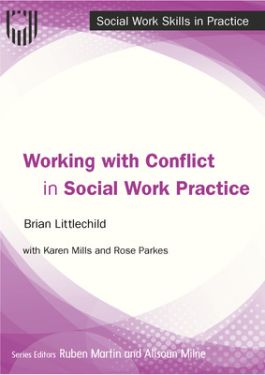Working with Conflict in Social Work Practice
- Note: the eBook does not include access to Connect
- Access the eBook anytime, anywhere: online or offline
- Create notes, flashcards and make annotations while you study
- Full searchable content: quickly find the answers you are looking for
CHAPTER 1
Introduction
CHAPTER 2
Generic approaches to methods of working with conflict in social work practice
CHAPTER 3
Conflicts in social work with adult service user groups
CHAPTER 4
Working with conflict in social work with children, families and young people
CHAPTER 5
Dealing with physical violence and threats from service users and carers: personal approaches and organisation responsibilities
CHAPTER 6
Dealing with abusive behaviour, threats, sexual/racist/disablist/biphobic and transphobic /homophobic abuse and harassment
CHAPTER 7
Dealing with conflict between service users and carers: domestic violence and safeguarding of children and adults
CHAPTER 8
Recognising and working positively with conflict on social work qualifying courses - Dr Karen Mills and Rose Parkes
CHAPTER 9
Recognizing and working positively with conflict in workplace settings
CHAPTER 10
Recognizing and working positively with conflict with staff in other agencies
CHAPTER 11
Responding to workplace and service user-based conflicts
CHAPTER 12
Conclusion: Working with Conflict in Social Work Practice
In addition, the text sets out the complex, multi¬-layered and sometimes conflicting roles within social work settings, with the balancing of care and control functions, and safeguarding and empowering approaches.
Based on evidence of the range, extent and effects of behaviour, the book offers advice on how you can best recognize and work with issues that can cause conflict. These include:
• Reluctant service user engagement, resistance, and oppositional behaviours.
• Aggression, threats, abuse, and physical violence.
• Safeguarding responsibilities for vulnerable people, including in domestic violence and vulnerable adults and children work.
• Sexist, disablist, and racist behaviours, or where someone is being negatively targeted, bullied or harassed because of LGBTQ+ status.
• Situations where there is potential conflict between students, colleagues, managers, or other professionals (e.g. whistleblowing).
This book forms part of the Social Work Skills in Practice series and is essential reading for social work students and practitioners.
Brian Littlechild is a Professor of Social Work at the University of Hertfordshire, UK, with a practice and management background in mental health, looked-after children, child safeguarding and working with young people who have offended. He has researched, published, worked, and trained in this area for over 35 years.
Karen Mills is Programme Lead for the MSc Social Work and Step up to Social Work Programmes at the University of Hertfordshire, UK.
Rose Parkes is Deputy Head of Higher Education at University College Jersey, UK, and leads the BA Social Work course.

